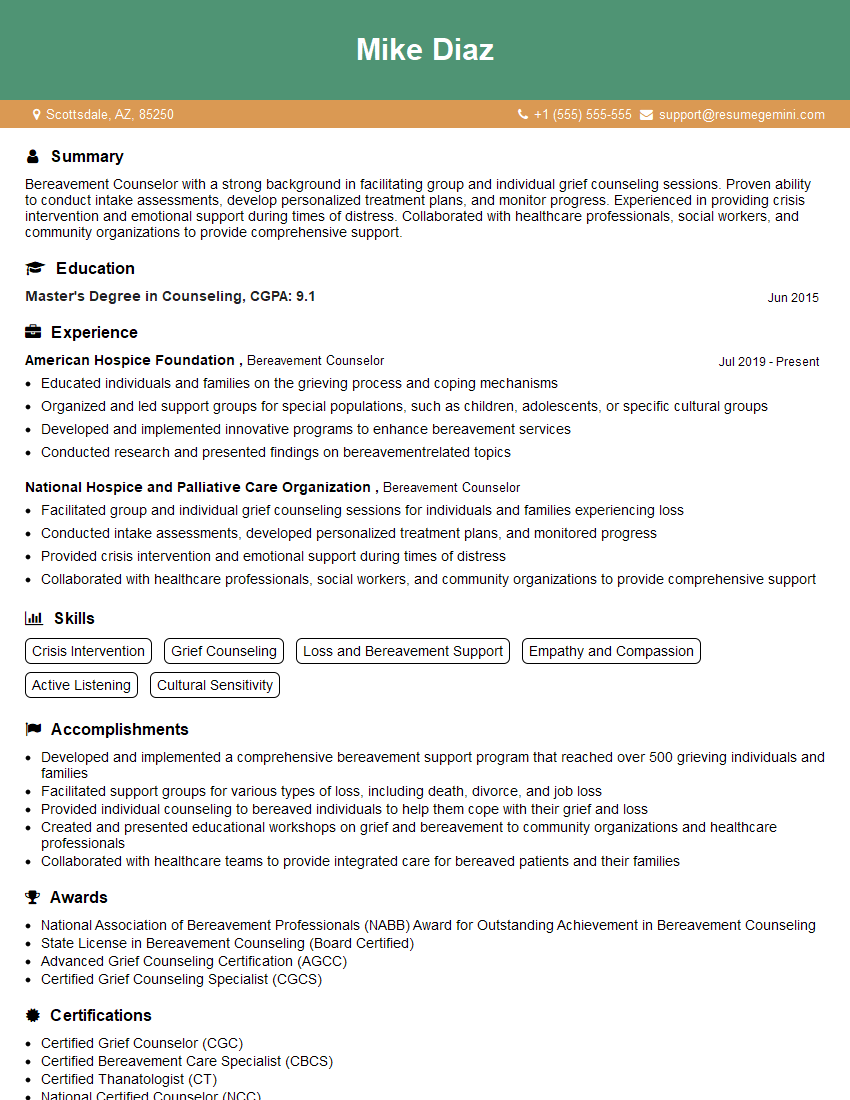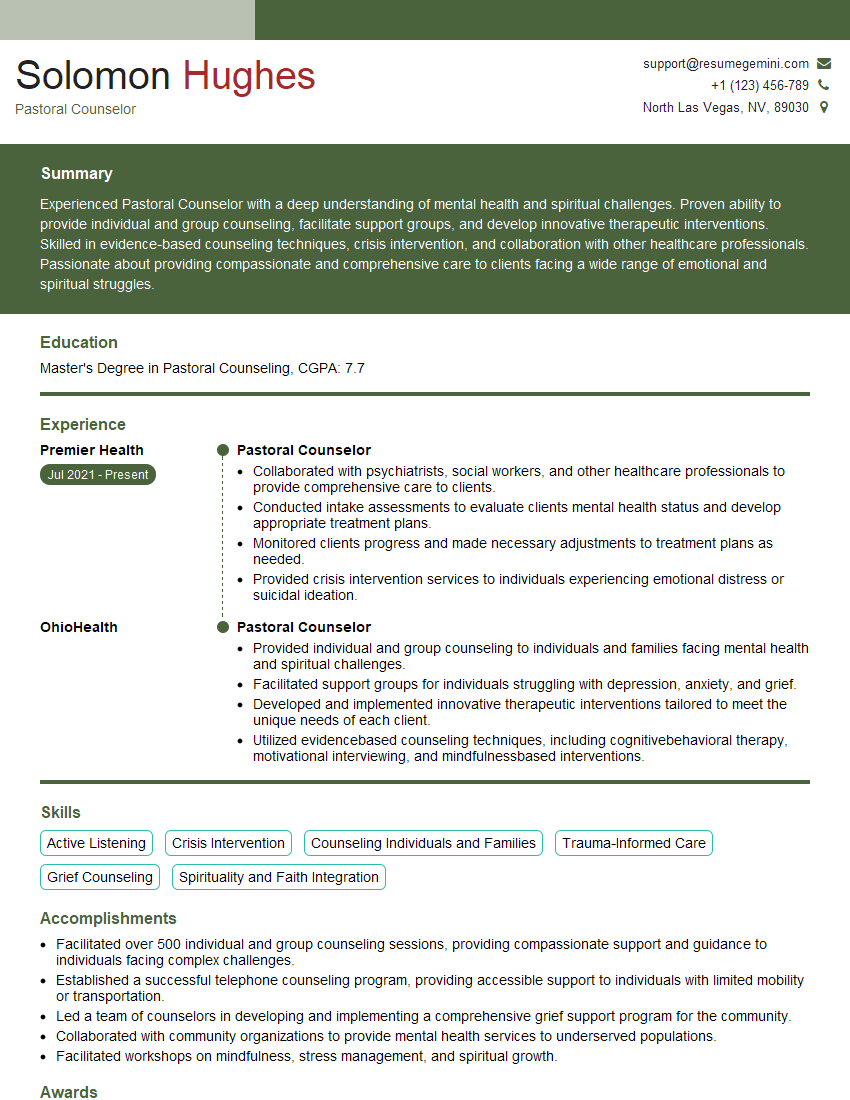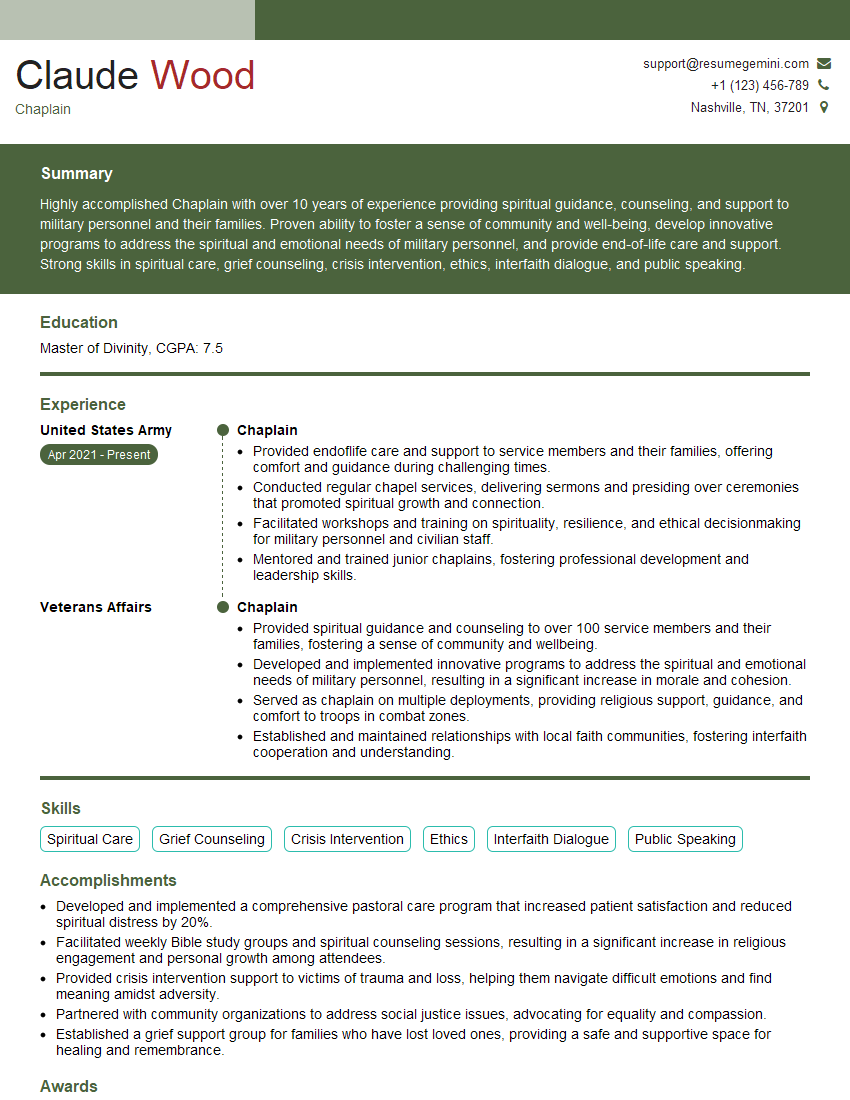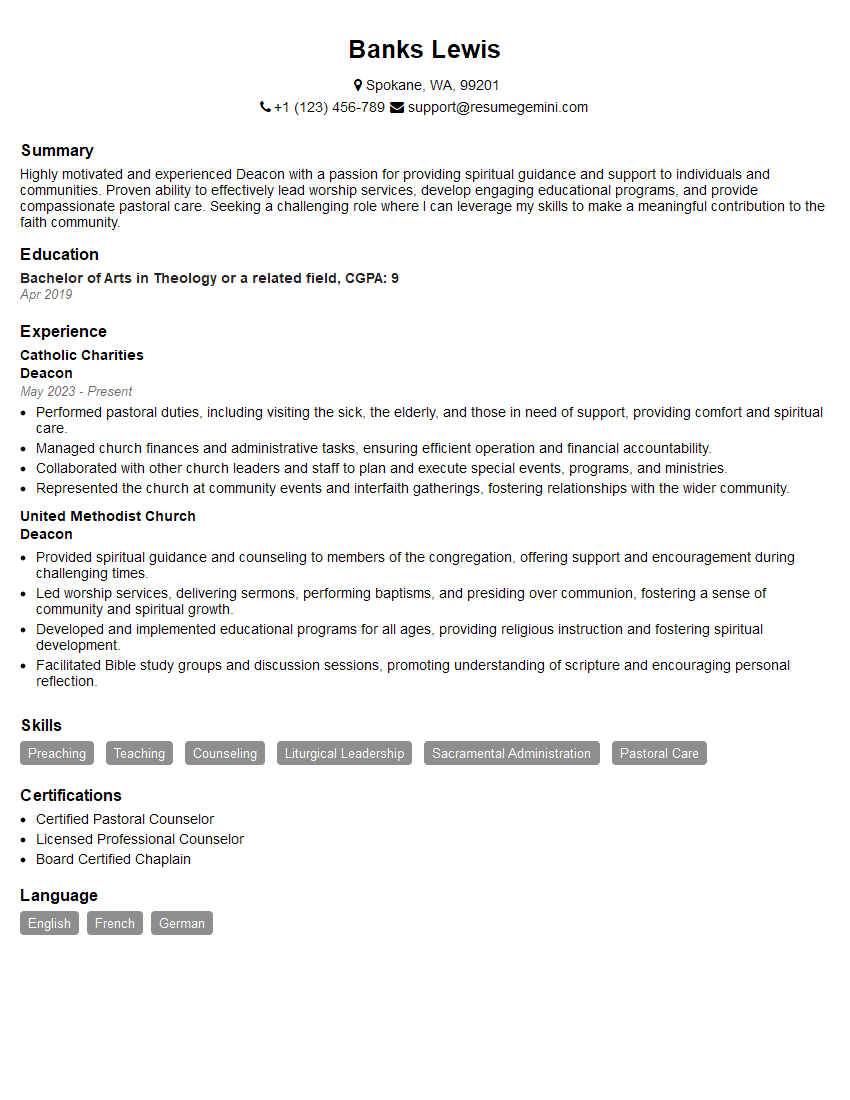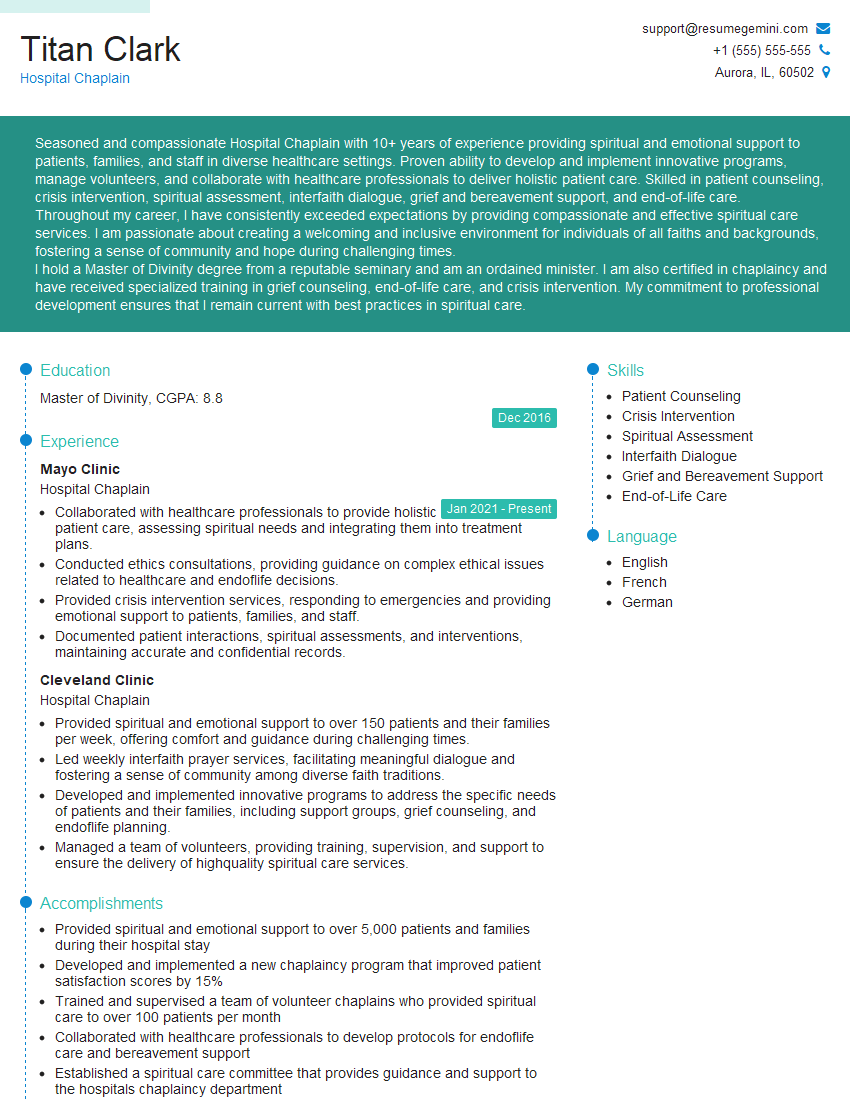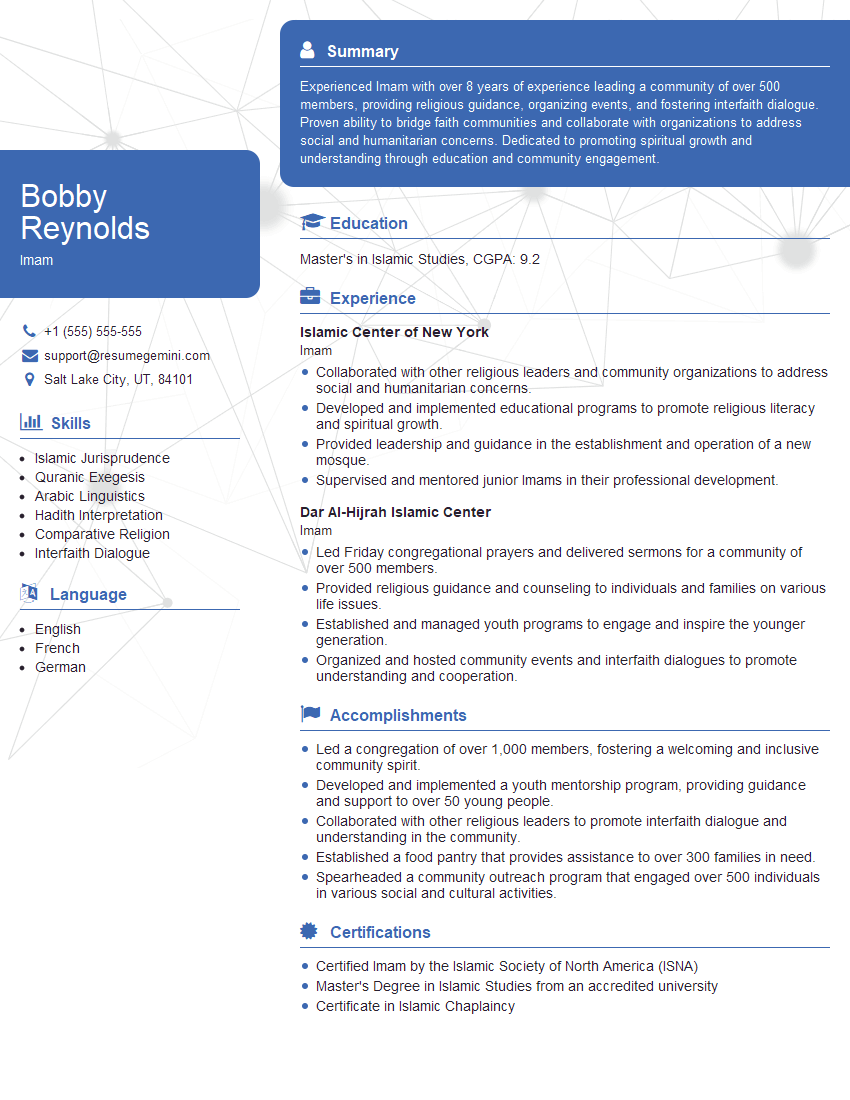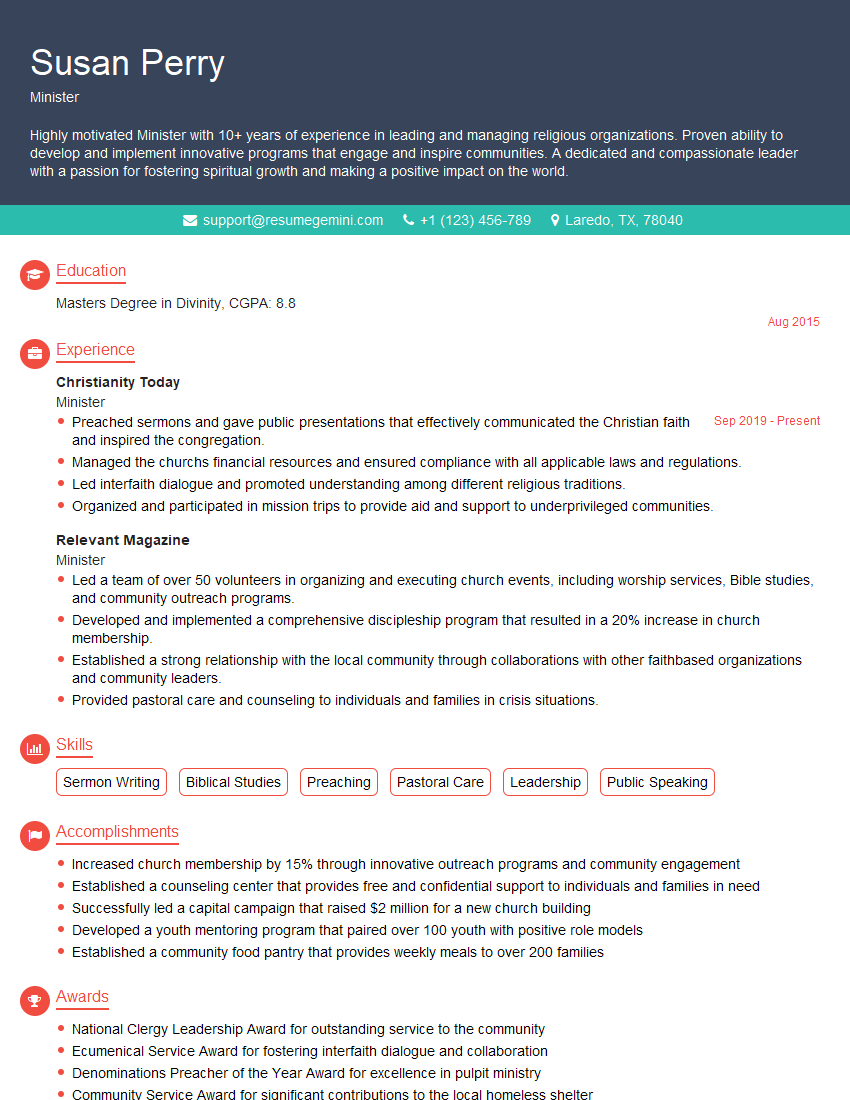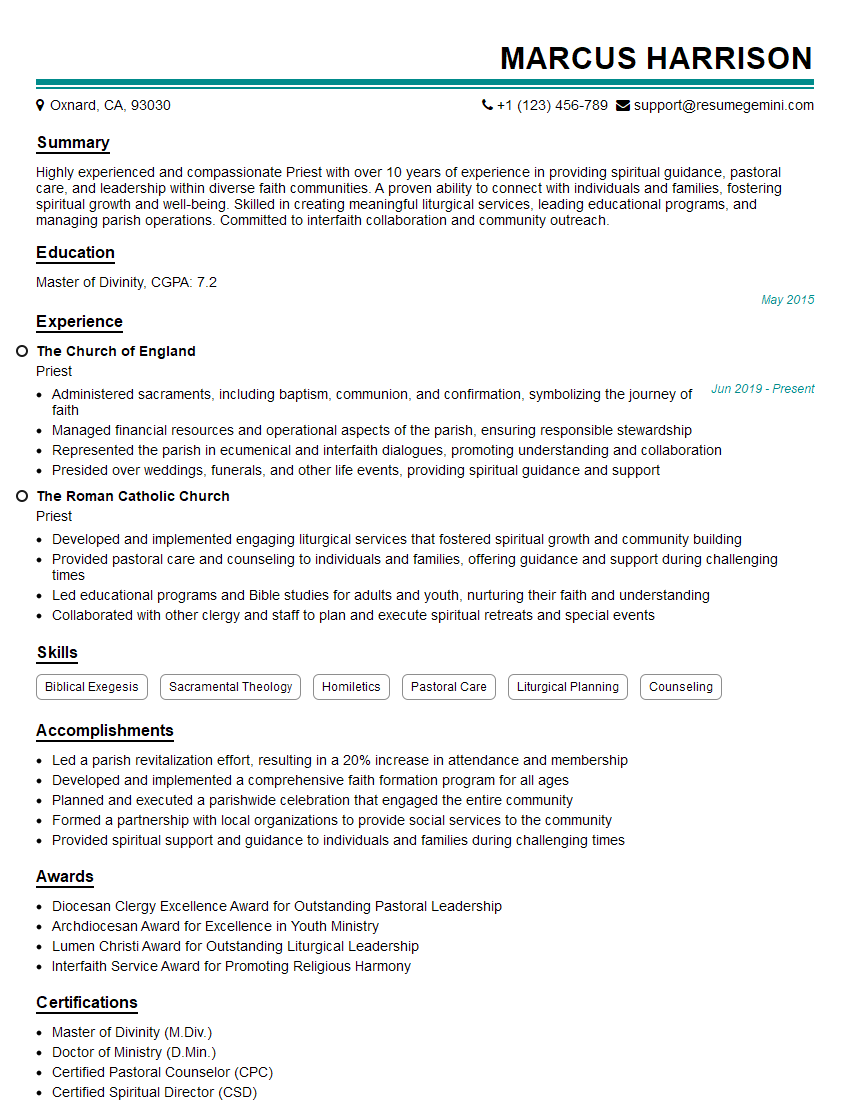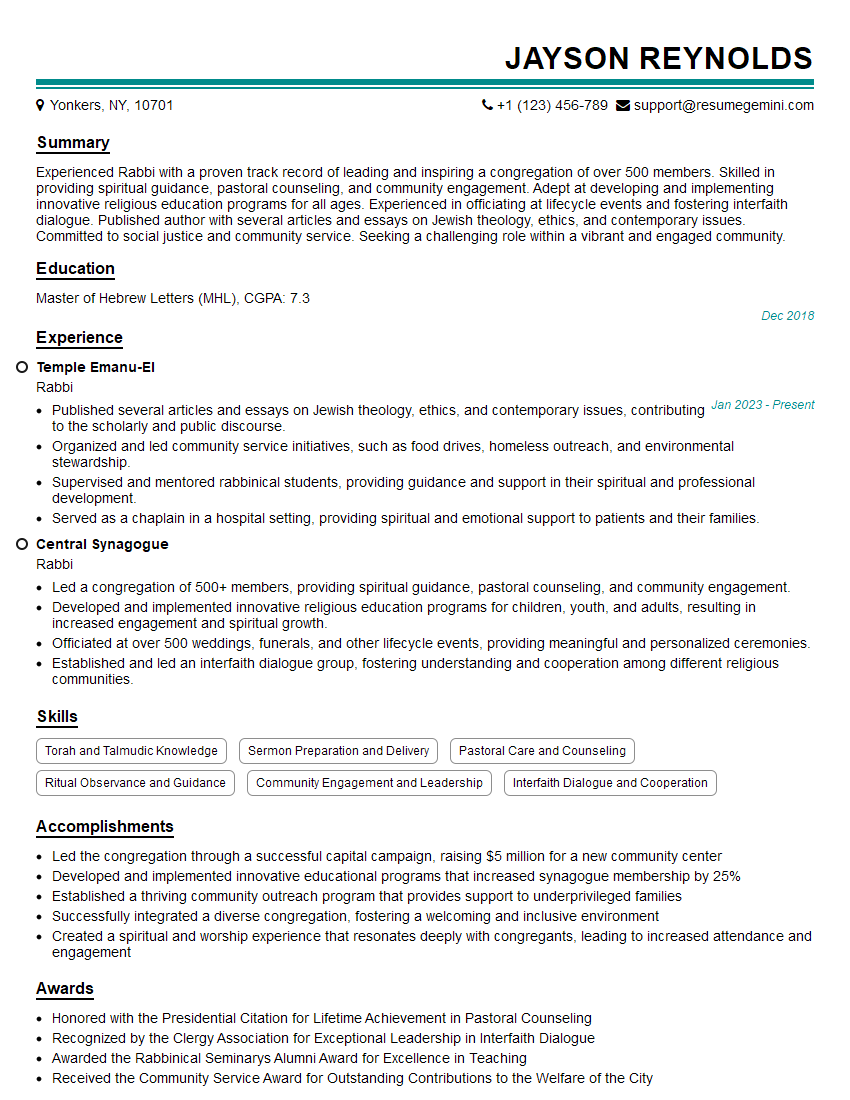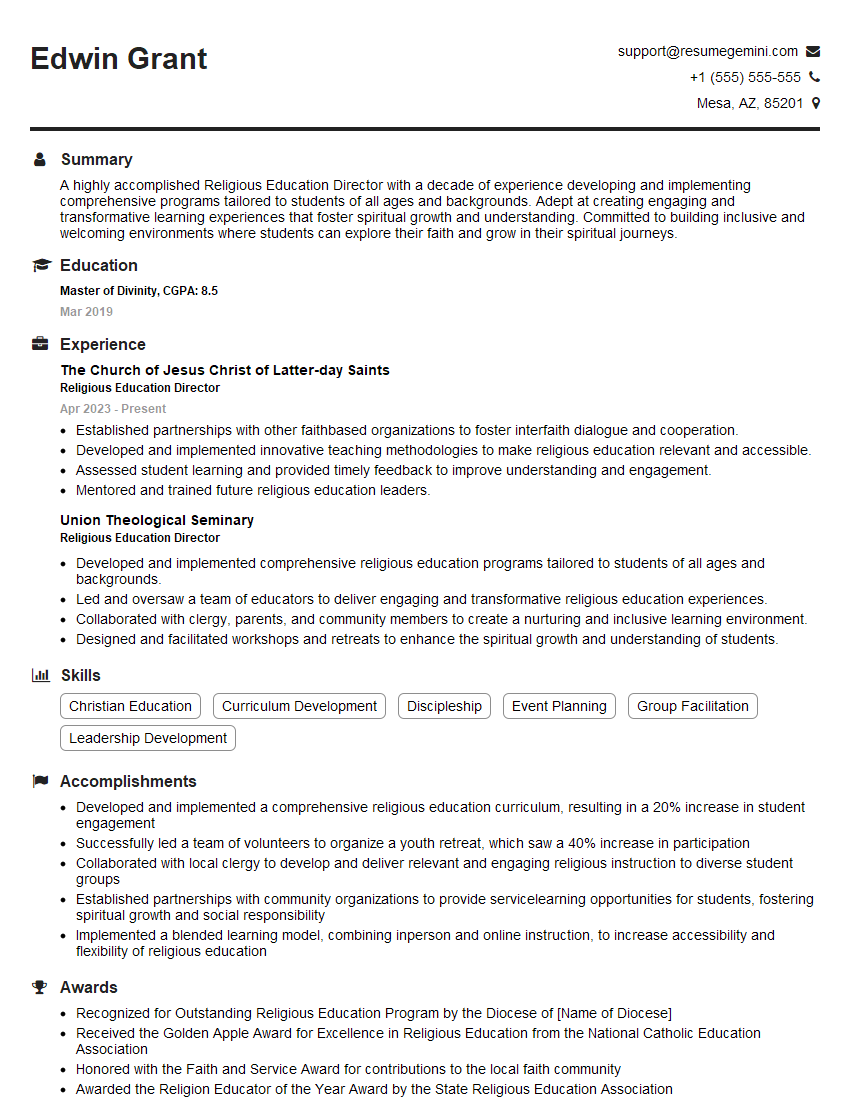Interviews are more than just a Q&A session—they’re a chance to prove your worth. This blog dives into essential Religious Support and Pastoral Care interview questions and expert tips to help you align your answers with what hiring managers are looking for. Start preparing to shine!
Questions Asked in Religious Support and Pastoral Care Interview
Q 1. Describe your experience providing spiritual guidance in challenging situations.
Providing spiritual guidance in challenging situations requires a delicate balance of empathy, active listening, and a deep understanding of the individual’s faith and beliefs. It’s not about imposing my own views but about walking alongside them on their journey.
For example, I worked with a patient facing a terminal illness. Their faith offered comfort, but their anger and fear were also very real. My approach involved validating their emotions, offering space for their grief, and exploring how their faith could provide strength and meaning during this difficult time. We explored scripture together, focusing on passages about hope and perseverance. We didn’t shy away from the difficult questions, and I helped them find ways to connect with their spiritual community for support.
Another instance involved a family struggling with a child’s addiction. We worked together to explore themes of forgiveness, resilience, and the power of prayer within their faith tradition. I facilitated honest conversations and helped them access resources that were congruent with their values, aiding their path towards healing and reconciliation.
Q 2. How do you address conflicting religious beliefs within a diverse population?
Addressing conflicting religious beliefs within a diverse population demands sensitivity, respect, and a commitment to inclusivity. My approach centers on creating a safe and welcoming space where all individuals feel heard and valued, regardless of their faith background.
Rather than imposing a particular viewpoint, I focus on identifying the shared values and common ground among different faiths. For instance, the concepts of compassion, forgiveness, and love for one’s neighbor often transcend specific religious doctrines. I strive to facilitate dialogues that encourage understanding and mutual respect. I use open-ended questions to guide conversations, focusing on individuals’ personal experiences and beliefs rather than imposing doctrinal interpretations.
I also ensure that any guidance provided respects the autonomy of each individual, recognizing that they have the right to adhere to their own beliefs and practices. If a situation arises that I feel is beyond my expertise, I refer the individual to a qualified professional within their faith community.
Q 3. Explain your approach to crisis intervention within a faith-based context.
Crisis intervention within a faith-based context integrates spiritual and emotional support to help individuals navigate difficult circumstances. It’s a holistic approach that acknowledges the interconnectedness of one’s faith, emotional state, and physical well-being.
My approach begins with immediate assessment of the situation to ensure safety and stability. I then provide a listening ear, creating a safe space for the individual to express their emotions and experiences. I use active listening skills and validate their feelings, offering comfort and reassurance. Depending on the situation, this may involve prayer, meditation, or simply being present with them.
Next, I help them connect with their faith community or other support systems. This could be through prayer groups, faith-based counseling, or support from family and friends. In cases where professional help is needed, I facilitate referrals to mental health professionals or other specialists while maintaining respect for their faith traditions. The goal is to empower them to utilize their faith as a source of strength and resilience.
Q 4. How do you maintain confidentiality and ethical boundaries in pastoral care?
Maintaining confidentiality and ethical boundaries in pastoral care is paramount. It’s about safeguarding the trust individuals place in me and upholding the highest standards of professional conduct.
I clearly communicate my limitations and the boundaries of confidentiality at the outset of any interaction. While confidentiality is highly valued, there are exceptions, such as instances of child abuse or potential harm to self or others. In these situations, mandated reporting protocols are followed, and I explain this to the individual beforehand.
I also maintain professional objectivity, avoiding personal relationships that might compromise my ability to provide unbiased support. Continual reflection on my own biases and beliefs is crucial to ensure ethical practice. My commitment to ongoing professional development ensures I am up-to-date on ethical guidelines and best practices.
Q 5. Describe your experience facilitating grief and bereavement support groups.
Facilitating grief and bereavement support groups provides a safe and supportive space for individuals to process their loss within a faith-based context. It emphasizes the shared experience of grief and the power of community in healing.
My role involves creating a structured environment where participants feel comfortable sharing their emotions, experiences, and memories of their loved ones. I use techniques that encourage active listening, empathy, and mutual support among group members. I might draw from relevant scripture or theological perspectives to offer hope and comfort, but always in a way that respects individual beliefs and experiences.
I also integrate practical strategies for managing grief, such as healthy coping mechanisms, self-care practices, and finding meaning in loss. The focus is on fostering a sense of community and providing a supportive environment where participants can find strength in their shared faith and in each other.
Q 6. How do you integrate faith-based principles into counseling or guidance?
Integrating faith-based principles into counseling or guidance involves drawing upon the individual’s spiritual beliefs and values to support their healing and growth. It’s about utilizing the resources inherent within their faith tradition to address their challenges.
This might involve exploring relevant scripture, theological concepts, or spiritual practices to foster hope, meaning, and resilience. For example, a person struggling with guilt might find comfort in exploring biblical themes of forgiveness and grace. Someone facing difficult life choices might benefit from reflecting on their faith’s ethical principles and values.
However, it’s crucial to approach this with sensitivity, respecting the individual’s autonomy and avoiding imposing my own religious beliefs. The focus is always on empowering them to utilize their faith as a source of strength and guidance, tailored to their specific needs and understanding.
Q 7. What resources do you utilize to support your own spiritual well-being?
Maintaining my own spiritual well-being is essential for providing effective pastoral care. It requires self-awareness, intentional practices, and a commitment to personal growth. Spiritual burnout is a real risk, so I prioritize activities that nourish my soul and prevent depletion.
This includes regular prayer and meditation, spending time in nature, engaging in meaningful relationships with others, and participating in spiritual direction or supervision. I also read theological and spiritual literature and attend conferences and workshops to enhance my knowledge and skills. Finally, a healthy work-life balance, including sufficient rest and recreation, is essential to sustain my well-being.
Just as I encourage those I serve to nurture their spiritual health, I must model this for myself. My own well-being is directly linked to the quality of care I am able to provide.
Q 8. How would you handle a situation where a patient/client expresses doubt or anger towards their faith?
When a patient expresses doubt or anger towards their faith, it’s crucial to approach the situation with empathy and respect. The first step is active listening – truly hearing their concerns without judgment. I would create a safe space for them to share their feelings, validating their experience even if I don’t necessarily agree with their perspective. It’s not about trying to ‘fix’ their faith, but offering compassionate support during a time of struggle. This might involve exploring their spiritual journey, helping them identify the root of their anger or doubt, and acknowledging the legitimacy of their emotions. For example, if a patient is angry at God for a personal tragedy, I might explore with them the theological concepts of suffering, divine justice, or free will, depending on their faith tradition. Ultimately, the goal is to help them find meaning and solace amidst their doubts, perhaps by connecting them with resources or support groups within their faith community or exploring alternative coping mechanisms.
For instance, I once worked with a woman who felt abandoned by God after losing her child. We spent several sessions discussing her beliefs about God’s nature and her personal understanding of faith. Instead of offering pat answers, I helped her explore her own theological interpretations and find a way to reconcile her grief with her faith, even if that faith looked different than it had before.
Q 9. Explain your understanding of different religious traditions and their practices.
My understanding of religious traditions encompasses a broad spectrum, including major world religions such as Christianity (Catholicism, Protestantism, Eastern Orthodoxy), Islam (Sunni, Shia), Judaism (Orthodox, Conservative, Reform), Hinduism, Buddhism (Theravada, Mahayana), Sikhism, and Jainism, as well as various indigenous spiritualities. I am familiar with their core beliefs, rituals, and practices. For instance, I know the importance of prayer in Christianity and Islam, the significance of the Sabbath in Judaism, the concept of karma and reincarnation in Hinduism and Buddhism, and the emphasis on community in Sikhism and Jainism. Understanding these traditions is critical to providing appropriate and sensitive pastoral care. I also recognize the diversity within each tradition; there is no single ‘correct’ practice. I strive to avoid making assumptions and instead learn about each individual’s specific beliefs and practices.
- Christianity: Includes various denominations with differing interpretations of scripture and theological emphasis.
- Islam: Emphasizes the five pillars of faith: declaration of faith, prayer, charity, fasting during Ramadan, and pilgrimage to Mecca.
- Judaism: Observances include Shabbat, holidays, dietary laws (kashrut), and life cycle events.
- Hinduism: A diverse religion with a wide range of deities, practices, and philosophies.
- Buddhism: Focuses on meditation, mindfulness, and the path to enlightenment.
Q 10. Describe your experience working with individuals from various cultural backgrounds.
My experience working with individuals from various cultural backgrounds has been extensive. I’ve encountered people from diverse ethnicities, nationalities, and socioeconomic strata, each with their unique cultural values and beliefs influencing their spiritual experiences. This has involved adapting my communication style, understanding varying expressions of grief and joy, and being sensitive to cultural nuances in how individuals interact with their faith and spirituality. For example, I learned the importance of non-verbal communication in some cultures, and the sensitivity to certain topics, particularly with people who have experienced trauma in their native countries. This understanding is crucial for building trust and providing effective pastoral care.
One specific example involved working with a refugee family who had experienced significant trauma. It was essential to understand their cultural context, their specific religious beliefs, and their experience of displacement to offer them appropriate support. This included collaborating with interpreters, social workers, and community leaders to ensure holistic care.
Q 11. How do you assess the spiritual needs of individuals?
Assessing the spiritual needs of individuals requires a holistic and sensitive approach. It’s not just about asking if someone is religious; instead, it involves exploring their values, beliefs, sources of meaning, hope, purpose, connection, and their sense of peace or wellbeing. I utilize open-ended questions and active listening to understand their worldview. This might involve asking about their experiences of joy, suffering, connection to something larger than themselves, their coping mechanisms during challenging times, and their hopes for the future. I also pay attention to their body language, tone of voice, and overall demeanor, as these can provide valuable insights. The assessment is a continuous process, evolving as the relationship develops and circumstances change.
For example, I might ask questions like: ‘What gives your life meaning?’, ‘What brings you comfort or hope?’, ‘What are your sources of strength?’, or ‘What are your beliefs about life after death?’ The key is to create a safe and non-judgmental space where individuals feel comfortable sharing deeply personal information.
Q 12. How do you tailor your approach to meet the specific spiritual needs of different individuals?
Tailoring my approach to meet the specific spiritual needs of different individuals is paramount. This requires being culturally sensitive, understanding diverse expressions of faith, and adapting my communication style. For example, some individuals may benefit from prayer, meditation, or scripture reading, while others might find solace in nature, art, music, or community engagement. I avoid imposing my own beliefs or practices, instead facilitating exploration of their own resources for meaning and hope. This might involve collaborating with other faith leaders or community members who can provide specific support tailored to their faith tradition. For someone struggling with grief, different religious traditions offer different means of comfort and healing, and my response must account for this.
For example, I might suggest a guided meditation practice for someone from a Buddhist background, while offering a different kind of support, perhaps by providing resources relevant to their specific Christian denomination for someone from a Christian background who is struggling with feelings of guilt. The focus is always on empowering individuals to find their own path to healing and spiritual growth, based on their own beliefs and values.
Q 13. What are the ethical considerations in providing pastoral care in a healthcare setting?
Ethical considerations in providing pastoral care in a healthcare setting are crucial. Maintaining confidentiality is paramount, adhering to professional boundaries, respecting patient autonomy, and avoiding coercion are critical. It is also essential to be aware of the potential for conflicts of interest, such as personal biases influencing care, or potential for exploitation of vulnerable patients. Honesty and transparency are essential; if I am unable to provide appropriate care due to a conflict of interest or lack of expertise in a particular religious tradition, I must refer the patient to someone who can better assist them. Respect for diverse perspectives and beliefs is also essential. Maintaining appropriate professional boundaries is vital to ensure trust and safety for the patient.
Furthermore, adhering to the institution’s policies and guidelines is crucial, particularly concerning patient privacy, data protection, and documentation. Ethical guidelines of the relevant professional organization should also be followed.
Q 14. How do you work collaboratively with other healthcare professionals to provide holistic care?
Collaborative care is integral to holistic healthcare. I work closely with other healthcare professionals, including physicians, nurses, social workers, and other therapists, to provide comprehensive care. This involves sharing relevant information (while maintaining confidentiality), coordinating care plans, and ensuring that spiritual needs are integrated into the overall treatment plan. Regular communication and meetings with the healthcare team are essential to ensure a consistent and supportive approach. For example, I might work with a social worker to address social determinants of health impacting a patient’s spiritual well-being, or with a physician to understand the physical and emotional effects of an illness on a patient’s faith. The goal is to create a supportive network that addresses the patient’s needs holistically.
A collaborative approach ensures that the patient receives a comprehensive and coordinated plan of care that addresses all aspects of their well-being, including their spiritual and emotional needs. It also ensures that appropriate resources are available to the patient and their family.
Q 15. Describe your experience conducting religious ceremonies or services.
Over the past ten years, I’ve conducted a wide range of religious ceremonies and services, primarily within the [Specify Denomination/Tradition] tradition. This includes, but isn’t limited to, weddings, funerals, baptisms, and memorial services. My approach centers on creating a deeply meaningful and personalized experience for each individual and family. For example, in a recent funeral service, the family shared stories of the deceased’s life that highlighted their vibrant personality and love for nature. I incorporated these into the service, reading excerpts from their favorite poems and incorporating natural elements into the setting, creating a truly unique and fitting tribute. Another example involved a wedding where the couple wished to incorporate elements from both their cultural backgrounds, creating a blended ceremony that reflected their unique story. In each instance, thorough preparation, active listening, and a sensitive approach to the specific needs of the occasion have been paramount.
I strive to create a comforting and spiritually uplifting environment, adapting the traditional structure to suit the needs and preferences of those involved. I’m equally comfortable conducting a traditional service according to established liturgical guidelines as I am leading a more informal gathering based on the family’s wishes.
Career Expert Tips:
- Ace those interviews! Prepare effectively by reviewing the Top 50 Most Common Interview Questions on ResumeGemini.
- Navigate your job search with confidence! Explore a wide range of Career Tips on ResumeGemini. Learn about common challenges and recommendations to overcome them.
- Craft the perfect resume! Master the Art of Resume Writing with ResumeGemini’s guide. Showcase your unique qualifications and achievements effectively.
- Don’t miss out on holiday savings! Build your dream resume with ResumeGemini’s ATS optimized templates.
Q 16. How do you manage difficult conversations with families facing loss or grief?
Managing difficult conversations with grieving families requires a high level of empathy, active listening, and skillful communication. My approach prioritizes validating their feelings, offering compassionate support, and creating a safe space for them to express their grief. I avoid platitudes and instead focus on genuine presence and active listening. For instance, I might start by simply acknowledging the pain and loss, saying something like, “This must be incredibly difficult for you.” I avoid offering unsolicited advice or trying to minimize their pain. Instead, I ask open-ended questions such as, “How are you coping with this loss?” or “What are some of your most cherished memories of [deceased]?” This allows them to lead the conversation and share at their own pace.
I often use a framework of active listening, reflecting back their feelings and ensuring they feel heard and understood. It’s crucial to remember that grief manifests differently for each individual and requires a tailored approach. I also make it clear that there is no right or wrong way to grieve. Providing resources and referrals to grief counseling or support groups when appropriate is also part of my role in supporting families during their time of immense sorrow.
Q 17. How do you balance providing pastoral care with respecting autonomy and personal beliefs?
Balancing pastoral care with respecting autonomy and personal beliefs is a cornerstone of ethical and effective practice. It’s about recognizing that each individual has their own unique spiritual journey and worldview, which may differ significantly from my own. My role is not to impose my beliefs but to provide compassionate support and guidance within the framework of their own values. This includes being respectful of different religious traditions, spiritual practices, or even non-religious perspectives.
For example, if someone is struggling with their faith, I would actively listen to their concerns and offer support without trying to force them to believe something they don’t. I might explore their questions with them, using open-ended questions to guide their own reflection and discovery. Alternatively, if someone is facing a difficult medical decision, I would help them clarify their values and priorities, supporting their ability to make an informed and autonomous choice, regardless of their spiritual beliefs. This might involve exploring relevant ethical frameworks, connecting them with resources, and facilitating conversations with healthcare providers. Ultimately, it’s about empowering individuals to make decisions that are congruent with their own values and beliefs.
Q 18. Describe your experience with providing pastoral care to individuals with specific medical conditions.
My experience providing pastoral care to individuals with specific medical conditions includes working with patients facing chronic illness, terminal illness, and disabilities. I’ve found that the key is to approach each situation with sensitivity and understanding of the individual’s physical and emotional needs. This often involves collaboration with medical professionals to understand the patient’s medical situation and how best to offer support. For example, I worked with a patient battling cancer who found solace in prayer and meditation. I adapted my visits to accommodate their physical limitations, offering shorter visits and focusing on spiritual conversation that brought them comfort and peace. In another case, I supported a patient with a disability by offering accessible resources and tailoring my communication style to their specific needs. In each case, I prioritized empathy, compassion, and a focus on providing hope and strength in the face of adversity.
Understanding the psychological and spiritual impact of illness is crucial. This involves acknowledging their fears, anxieties, and existential questions, providing a space for open dialogue and exploration of their spiritual and emotional needs within the context of their physical limitations. Often, this might involve focusing on building resilience, hope, and a sense of meaning in life regardless of their health challenges.
Q 19. How do you support individuals in their spiritual growth and development?
Supporting individuals in their spiritual growth and development involves fostering a relationship built on trust, mutual respect, and open communication. It’s a collaborative process where I act as a guide, not a director. I might use different approaches depending on the individual’s needs, drawing on methods like spiritual direction, guided meditation, scripture study, or simply engaging in thoughtful conversation that explores meaning and purpose in life. For instance, I might use open-ended questions to help someone explore their values and beliefs, or help them connect their spiritual life to their daily experiences. I also encourage self-reflection and the use of spiritual practices like prayer or mindfulness to deepen their relationship with themselves and their understanding of their spiritual journey.
In essence, my role is to create space for spiritual exploration and to provide resources and tools that can help individuals to connect with their faith in a meaningful and authentic way. I emphasize the importance of personal discovery and encourage them to seek wisdom from their own experiences and spiritual traditions. It’s a process of growth and transformation that happens at their own pace and in their own way.
Q 20. Describe a time you had to make a difficult ethical decision in your role.
One challenging ethical dilemma I faced involved a family requesting a specific religious rite that conflicted with my understanding of ethical practice within my faith tradition. They were adamant about including this element in their child’s baptism ceremony, believing it to be essential for their spiritual well-being. However, this practice raised concerns for me regarding the potential for misinterpretation and unintended consequences. After careful consideration and consultation with trusted colleagues, I opted to have an open and honest conversation with the family, explaining my concerns and the potential implications. We engaged in a respectful dialogue, exploring alternative ways to honor their wishes while upholding ethical principles within our faith tradition.
The solution involved finding a compromise that honored their request symbolically while mitigating the potential risks. This decision highlighted the importance of ongoing dialogue, mutual respect, and a commitment to ethical decision-making even in complex and sensitive situations. It also underscored the necessity of seeking guidance and support from colleagues when confronted with difficult ethical dilemmas.
Q 21. How do you stay updated on current best practices in religious support and pastoral care?
Staying updated on current best practices in religious support and pastoral care requires a multifaceted approach. I regularly attend professional development workshops and conferences, engaging with leading experts in the field and learning about new approaches and research. I actively participate in professional organizations such as [Name relevant organizations], accessing their publications, resources, and networking opportunities. I also maintain a commitment to ongoing personal and spiritual development, reflecting on my practice and seeking guidance from mentors and supervisors.
Additionally, I regularly review relevant academic journals and publications, keeping abreast of new research and evolving best practices. A commitment to lifelong learning is crucial to ensuring that I’m equipped with the knowledge and skills to effectively provide pastoral care within a constantly changing context. This continuous learning ensures I maintain ethical and effective pastoral practices.
Q 22. How do you handle situations involving religious conflict or disagreement?
Religious conflict is unfortunately a reality in many settings. My approach centers around fostering respectful dialogue and understanding. I begin by actively listening to all parties involved, seeking to understand their perspectives and the root causes of the conflict, rather than immediately trying to solve the problem. This often involves identifying underlying emotional issues or misunderstandings that fuel the disagreement.
Next, I help facilitate communication, ensuring each individual feels heard and validated. I might use techniques like reframing statements to reduce defensiveness and promote empathy. The goal isn’t necessarily to force agreement, but to create a space where respectful disagreement can exist. For example, in a dispute over liturgical practices, I’d help the individuals understand the theological basis for their different viewpoints, and potentially explore alternative approaches that accommodate both perspectives.
Finally, I work to identify common ground and explore potential solutions that honor the beliefs of all involved. If resolution isn’t immediately possible, I will help them find appropriate channels for mediation or conflict resolution within their faith community. It’s crucial to respect the autonomy of each individual and their right to hold their beliefs, even if they differ from others.
Q 23. Explain your experience in developing and implementing religious education programs.
In my previous role at [Name of Organization], I developed and implemented a multi-year religious education program for children aged 8-12 focusing on [Specific Religious Tradition]. The program utilized a variety of methods including interactive storytelling, hands-on activities, and age-appropriate discussions about key theological concepts and ethical principles. I designed the curriculum to be inclusive and engaging for children from diverse backgrounds, ensuring it was accessible to all learning styles.
For example, the program incorporated service learning projects where children participated in community outreach initiatives, linking their learning directly to real-world applications. We also integrated technology such as interactive learning platforms and videos to enhance engagement and cater to modern learning styles. The effectiveness of the program was monitored through regular assessments, feedback sessions with parents and students, and observation of student participation and comprehension. We made adjustments based on this data to continuously improve the curriculum and teaching methods. The result was a significant increase in student engagement and a deeper understanding of their faith.
Q 24. Describe your approach to community outreach and engagement within a faith-based context.
Community outreach in a faith-based context is about extending the values and mission of the faith community to the broader community. My approach involves building relationships and trust with various community organizations and leaders. This includes collaborating with local charities, schools, and community centers on projects that address pressing social needs, such as poverty, homelessness, or environmental concerns. I believe in approaching outreach with humility and genuine concern, demonstrating the compassionate heart of the faith through action.
For example, I initiated a partnership between our church and a local homeless shelter, organizing regular volunteer opportunities for church members to provide meals and support to individuals experiencing homelessness. This outreach not only helped those in need but also fostered a sense of shared purpose and community among church members, strengthening their connection to their faith and the wider community. We also organized interfaith events to encourage dialogue and collaboration among different religious groups, promoting understanding and respect across faiths.
Q 25. How do you measure the effectiveness of your pastoral care interventions?
Measuring the effectiveness of pastoral care interventions requires a multifaceted approach. It’s not solely about quantifiable results, but rather a holistic assessment of the individual’s spiritual, emotional, and physical well-being. I use a combination of methods to gauge effectiveness.
Firstly, I regularly engage in reflective practice, documenting my interactions and the individual’s progress. This involves observing changes in their demeanor, attitude, and behavior. Secondly, I employ qualitative methods such as open-ended interviews and feedback sessions to understand their subjective experiences and perceived changes in their well-being. I also utilize standardized assessment tools which may measure things like spiritual well-being, hope, and coping skills, though these are used judiciously and in conjunction with other forms of assessment to avoid oversimplifying a complex human experience. Finally, I collaborate with other members of the care team, if applicable, to gain a broader perspective on the individual’s progress.
Q 26. Describe your experience working with volunteers or interns in a religious setting.
Working with volunteers and interns in a religious setting requires careful planning, training, and supervision. I’ve had extensive experience mentoring both groups. My approach prioritizes providing clear expectations, comprehensive training, and regular feedback. I create a supportive environment where they feel comfortable asking questions and seeking guidance.
For example, before starting any volunteer work, interns and volunteers undergo training sessions on relevant topics such as confidentiality, boundaries, and the specific tasks they’ll be undertaking. I provide ongoing support and supervision, offering regular feedback and addressing any challenges that arise. I strive to create a learning environment where they gain valuable skills and experience while contributing meaningfully to the ministry. This involves delegating tasks appropriate to their skill level, providing regular feedback, and fostering a sense of collaboration and team work. Open communication is essential.
Q 27. How do you maintain professional boundaries while building rapport with individuals?
Maintaining professional boundaries while building rapport is a delicate balance. While empathy and connection are essential in pastoral care, it’s crucial to avoid blurring the lines of professional relationships. I establish clear boundaries from the outset, communicating expectations clearly and consistently. This includes setting limits on the time and nature of interactions, and ensuring professional conduct in all communications.
For instance, I communicate regularly scheduled meeting times rather than offering open-ended availability, ensuring that personal issues do not become the primary focus of our interactions. I also avoid engaging in overly personal conversations or accepting gifts of significant value. If I sense a boundary is being crossed, I address it directly and professionally, clarifying the professional nature of our relationship. Regular self-reflection and supervision aid in maintaining these boundaries and ensuring ethical practice.
Q 28. Explain your experience with administrative tasks associated with pastoral care.
Administrative tasks are an integral part of pastoral care. My experience encompasses a wide range of responsibilities, including scheduling appointments, managing records (ensuring confidentiality and compliance with relevant regulations), preparing reports, coordinating events, and managing budgets. Proficiency in these areas is essential for effective pastoral care delivery.
I utilize various software and tools to streamline these tasks, including scheduling applications, database management systems for confidential record keeping, and budgeting software. For example, I’ve successfully implemented a new database system that improved the efficiency of tracking client interactions and maintaining accurate records, ensuring seamless access to information while upholding strict confidentiality. This allowed for better management of client needs and a more organized approach to pastoral care.
Key Topics to Learn for Religious Support and Pastoral Care Interview
- Spiritual Assessment: Understanding diverse religious beliefs and practices; conducting sensitive and empathetic assessments of individuals’ spiritual needs and preferences.
- Counseling and Pastoral Care Techniques: Applying active listening, empathy, and appropriate therapeutic interventions; navigating ethical dilemmas and maintaining professional boundaries.
- Grief and Loss Support: Providing comfort and guidance to individuals and families experiencing bereavement; understanding diverse cultural perspectives on death and dying.
- Crisis Intervention: Responding effectively to emergencies and providing immediate support; collaborating with multidisciplinary teams to address complex situations.
- Interfaith Dialogue and Collaboration: Fostering respectful relationships with individuals of diverse faiths; working effectively in interfaith settings.
- Ethical Considerations: Navigating complex ethical dilemmas related to confidentiality, informed consent, and end-of-life care; adhering to professional codes of conduct.
- Community Engagement: Building relationships within the community; identifying and addressing spiritual needs within a broader social context.
- Self-Care and Resilience: Developing strategies for maintaining personal well-being and managing the emotional demands of pastoral care.
- Documentation and Record Keeping: Maintaining accurate and confidential records; complying with relevant legal and regulatory requirements.
Next Steps
Mastering Religious Support and Pastoral Care opens doors to rewarding careers offering profound impact on individuals and communities. To maximize your job prospects, crafting a strong, ATS-friendly resume is crucial. ResumeGemini can significantly enhance your resume-building experience, helping you create a compelling document that showcases your skills and experience effectively. We provide examples of resumes tailored to Religious Support and Pastoral Care to guide you in this process. Invest time in crafting a resume that truly reflects your capabilities and passion for this vital field. Your dedication to compassionate care will shine through!
Explore more articles
Users Rating of Our Blogs
Share Your Experience
We value your feedback! Please rate our content and share your thoughts (optional).
What Readers Say About Our Blog
Hi,
Business owners spend hours every week worrying about their website—or avoiding it because it feels overwhelming.
We’d like to take that off your plate:
$69/month. Everything handled.
Our team will:
Design a custom website—or completely overhaul your current one
Take care of hosting as an option
Handle edits and improvements—up to 60 minutes of work included every month
No setup fees, no annual commitments. Just a site that makes a strong first impression.
Find out if it’s right for you:
https://websolutionsgenius.com/awardwinningwebsites
Hello,
we currently offer a complimentary backlink and URL indexing test for search engine optimization professionals.
You can get complimentary indexing credits to test how link discovery works in practice.
No credit card is required and there is no recurring fee.
You can find details here:
https://wikipedia-backlinks.com/indexing/
Regards
NICE RESPONSE TO Q & A
hi
The aim of this message is regarding an unclaimed deposit of a deceased nationale that bears the same name as you. You are not relate to him as there are millions of people answering the names across around the world. But i will use my position to influence the release of the deposit to you for our mutual benefit.
Respond for full details and how to claim the deposit. This is 100% risk free. Send hello to my email id: [email protected]
Luka Chachibaialuka
Hey interviewgemini.com, just wanted to follow up on my last email.
We just launched Call the Monster, an parenting app that lets you summon friendly ‘monsters’ kids actually listen to.
We’re also running a giveaway for everyone who downloads the app. Since it’s brand new, there aren’t many users yet, which means you’ve got a much better chance of winning some great prizes.
You can check it out here: https://bit.ly/callamonsterapp
Or follow us on Instagram: https://www.instagram.com/callamonsterapp
Thanks,
Ryan
CEO – Call the Monster App
Hey interviewgemini.com, I saw your website and love your approach.
I just want this to look like spam email, but want to share something important to you. We just launched Call the Monster, a parenting app that lets you summon friendly ‘monsters’ kids actually listen to.
Parents are loving it for calming chaos before bedtime. Thought you might want to try it: https://bit.ly/callamonsterapp or just follow our fun monster lore on Instagram: https://www.instagram.com/callamonsterapp
Thanks,
Ryan
CEO – Call A Monster APP
To the interviewgemini.com Owner.
Dear interviewgemini.com Webmaster!
Hi interviewgemini.com Webmaster!
Dear interviewgemini.com Webmaster!
excellent
Hello,
We found issues with your domain’s email setup that may be sending your messages to spam or blocking them completely. InboxShield Mini shows you how to fix it in minutes — no tech skills required.
Scan your domain now for details: https://inboxshield-mini.com/
— Adam @ InboxShield Mini
Reply STOP to unsubscribe
Hi, are you owner of interviewgemini.com? What if I told you I could help you find extra time in your schedule, reconnect with leads you didn’t even realize you missed, and bring in more “I want to work with you” conversations, without increasing your ad spend or hiring a full-time employee?
All with a flexible, budget-friendly service that could easily pay for itself. Sounds good?
Would it be nice to jump on a quick 10-minute call so I can show you exactly how we make this work?
Best,
Hapei
Marketing Director
Hey, I know you’re the owner of interviewgemini.com. I’ll be quick.
Fundraising for your business is tough and time-consuming. We make it easier by guaranteeing two private investor meetings each month, for six months. No demos, no pitch events – just direct introductions to active investors matched to your startup.
If youR17;re raising, this could help you build real momentum. Want me to send more info?
Hi, I represent an SEO company that specialises in getting you AI citations and higher rankings on Google. I’d like to offer you a 100% free SEO audit for your website. Would you be interested?
Hi, I represent an SEO company that specialises in getting you AI citations and higher rankings on Google. I’d like to offer you a 100% free SEO audit for your website. Would you be interested?
good
